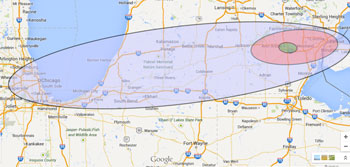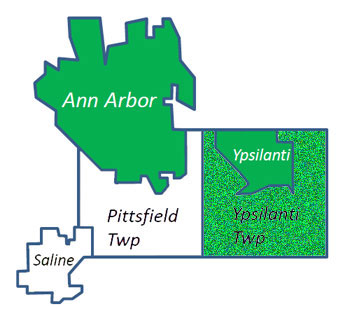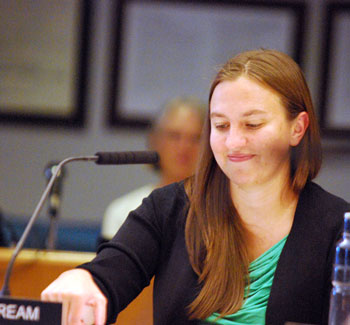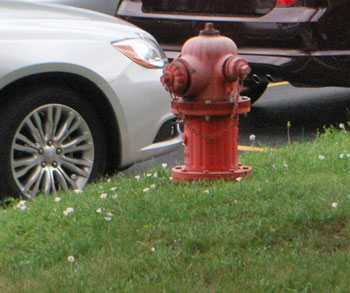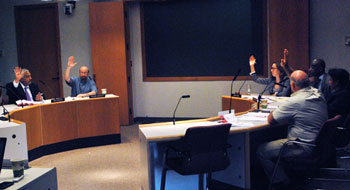At its July 1, 2013 meeting, the Ann Arbor city council will consider and likely adopt a new set of rules affecting meeting mechanics.
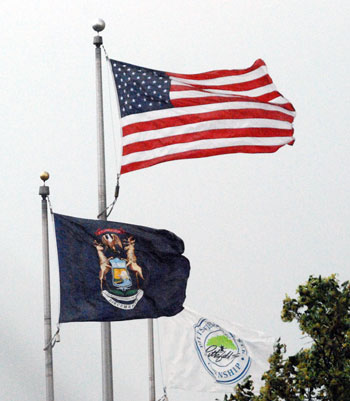
Flags flying over Pittsfield Township Hall on June 27, 2013. Political winds were also blowing (indoors, and not quite as hard) at a meeting also attended by representatives of Ypsilanti, Ann Arbor, Saline and Ypsilanti Township – on “urban core” transportation.
Easiest to quantify are rule changes affecting speaking time limits. For the public, the time per speaking turn will drop across the board – from three minutes to two minutes. For each councilmember, the total speaking time per item of debate will drop from eight minutes to five minutes.
Whether those quantitative changes will have a qualitative impact on the city council’s meetings is an open question. More likely to have a positive qualitative effect, I think, is a rules change that adds an opportunity for public commentary at the council’s work sessions.
The exchange of viewpoints among councilmembers during those work sessions is currently tentative and spare, often in the guise of merely asking a question. That’s because Michigan’s Open Meetings Act does not allow a gathering of councilmembers to include deliberations, unless an opportunity is provided for the public to address the council. By giving the public an opportunity to comment during those sessions, councilmembers will be free to engage in unfettered exchanges of viewpoint. And that will be a benefit to the public and to the city staff.
However, in this column I’d like to focus on a different proposed amendment to the rules – one that could potentially improve local governance, not just change what happens at city council meetings.
Among the rules changes is one that would move the mayor’s communications from a slot on the meeting agenda after all regular business to one that precedes all regular business. That’s important because the mayor’s communications include nominations to boards and commissions. That agenda slot also includes the council’s vote to confirm those appointments – typically at the following council meeting. This rule change will ensure that interested residents will not need to stay up until midnight or 3 a.m. – or whenever the council finishes its voting business – to find out who the mayor has nominated.
And that bit of extra spotlight on the nominations could lead to an interest on the part of the mayor – whoever might hold that position – in offering a better explanation of each nomination. It’s reasonable, I think, to get a better explanation than the kind we typically hear – generally a brief comment at the end of a meeting, when everyone is barely awake.
For example: What is it about the nominee’s philosophical orientation to the board’s subject matter that makes this person a good fit for the position? How was it that this person came to be chosen? Who is this person? To the extent that residents are given a clearer idea of how and why nominations are made to boards and commissions, that might increase the inclination of other qualified residents to offer their service.
In the near future, nominations to two significant boards will be made by mayor John Hieftje. One nomination is needed due to the expansion of the Ann Arbor Area Transportation Authority’s board – from seven to nine members. Of the two additional seats, the city of Ypsilanti will make one appointment. For that seat, Ypsilanti mayor Paul Schreiber will be nominating Gillian Ream at the Ypsilanti council’s July 2 meeting. Hieftje will be making the nomination for the other new AAATA seat. He will also need to make nominations to replace two departing members from the board of the Ann Arbor Downtown Development Authority – Leah Gunn and Newcombe Clark.
The public policy areas of the two boards overlap – not just because transportation is related to land use and development. The overlap also stems from the fact that the DDA manages the city’s public parking system, and the availability of parking is integral to the area’s transportation system.
So in this column, I’d like to sketch out some current policy issues to be faced by new appointees to the boards of these organizations. For the AAATA board, a pressing question will be: Should we ask voters to approve an additional transportation millage in November 2013? For the DDA board, an ongoing question will be: What’s an appropriate balance among users of the parking system – downtown residents, retail customers, and employees of downtown businesses?
But first, a little history. [Full Story]




